Pamela King's Blog, page 5
February 24, 2018
Desert Island Reading

When I was interviewed by TR Robinson https://trrobinsonpublications.com/2017/06/09/pamela-king-interview/ one of the questions she asked was:
If you were stranded on a desert island, which three books would you like to have with you?
This was my reply.
I’d probably miss the ship while trying to decide but here goes:
Narnia Chronicles for fantasy and child-like escapism A compendium edition of one of my favourite ‘who-dun-it writers’ A good size, up to date world history book with loads of information. I don’t travel light – can I take my kindle I can get a lot more on that?
***
Do you prefer to take your Kindle/eBook reader when you travel or do you still pack half a suitcase of books?
I confess I do both. What would I have to read when the battery goes flat?
What books would you have take to the desert island?
Published on February 24, 2018 12:18
February 17, 2018
Book Launch – Writers of Wollondilly
 Wollondilly Branch of the Fellowship of Australian Writers was launch yesterday by State President, Trevor Langlands.
Wollondilly Branch of the Fellowship of Australian Writers was launch yesterday by State President, Trevor Langlands.I have only been a member for a year and feel honoured they selected three of my stories for the book.
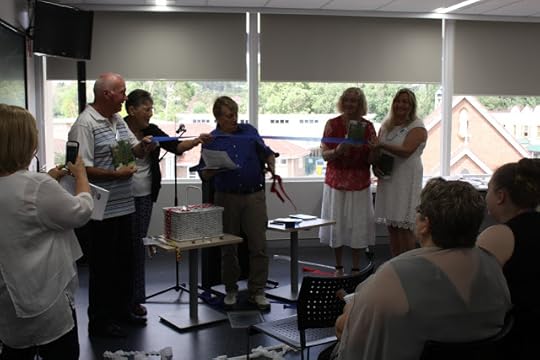
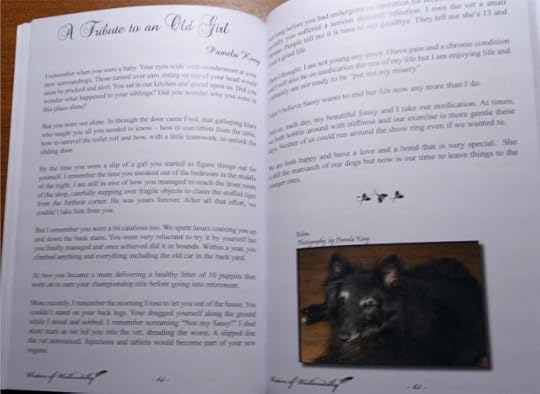
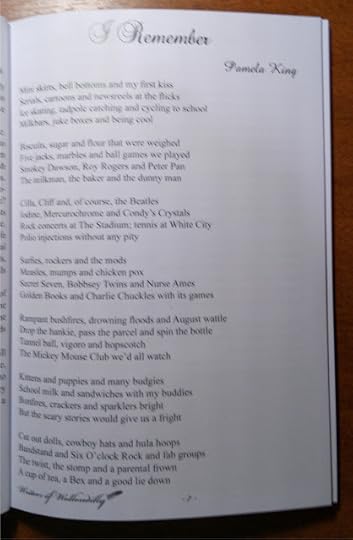
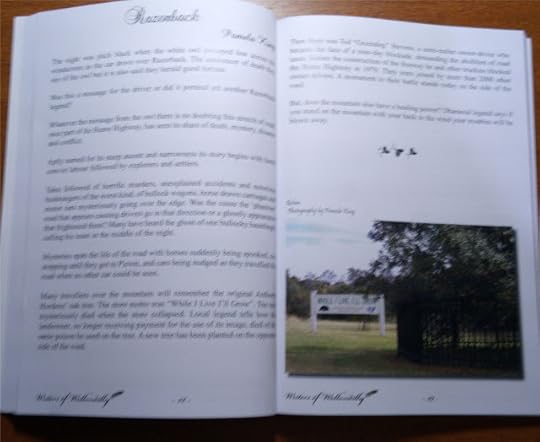
Published on February 17, 2018 12:44
February 11, 2018
Unplanned Adventure Part 2 by Pamela King
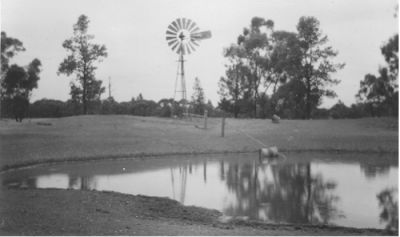 When I was in my early teens my parents owned a small mixed business in Mascot. One of our customers was an elderly lady confined to her home.
When I was in my early teens my parents owned a small mixed business in Mascot. One of our customers was an elderly lady confined to her home. Everyday I would deliver her bread, milk and other groceries. She insisted on paying me one shilling a week.
She had a married daughter, Mrs Sutcliffe, who lived on a sheep station in Goolgowi, near Griffith. Mrs Sutcliffe and her husband had three children. I was invited to spend the school holidays with them.
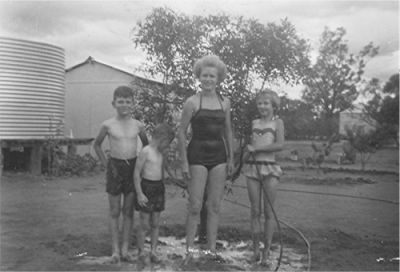
After the extraordinary train trip to the Riverina district, I expected my holiday to be unremarkable by comparison.
Nearly every morning Mr Sutcliffe invented a new way to wake me - holding my nose, banging saucepans, splashing water, even putting assorted creatures in my bed.
Often the kids and I would go out to set rabbit traps. One morning we caught a huge goanna. After releasing it (minus one leg) it took off after us. We ran like crazy, barefooted, back to the house. On the way, I trod on a red belly black snake. Fortunately, I was running so hard the snake didn’t have time to recover from its own shock to bite me.
In addition to hundreds of sheep there was quite a menagerie of other animals. The only ones I really cared for was the sweet natured milking cow and the working dogs. The cow loved a cuddle and would try and snuggle in while being milked. The dogs always accompanied us on our adventures, often getting into more trouble than we did.
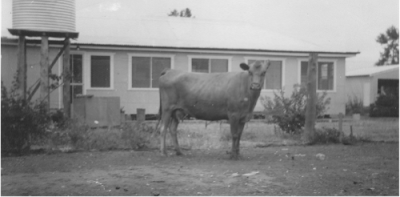
As for the rest! It is a wonder I am an animal lover.
The pet sheep did not like me. It was happy to have kittens, puppies and children on its back, but not me. If it was in the house yard when I went out in the morning it would head butt me all the way to the outside toilet.
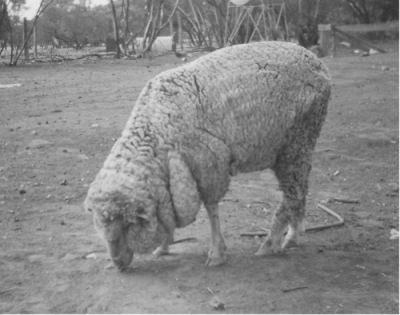
The huge goose thought it was the watch dog. It would also chase me and peck at my bottom.
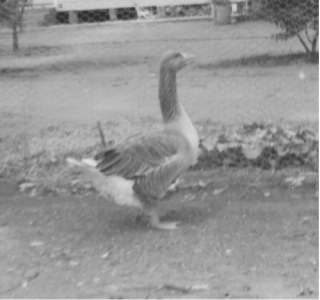 Then, Mr Sutcliffe thought I should learn to ride a horse. I am sure it was for his amusement and not for me to learn life skills. “Just go up when the horse goes up and down when it goes down”, he instructed. After thirty minutes of not getting the hang of this riding lark I’d had enough. Climbing down I said to him. “You might as well tell the horse to go up and down when I do because we are not communicating!”
Then, Mr Sutcliffe thought I should learn to ride a horse. I am sure it was for his amusement and not for me to learn life skills. “Just go up when the horse goes up and down when it goes down”, he instructed. After thirty minutes of not getting the hang of this riding lark I’d had enough. Climbing down I said to him. “You might as well tell the horse to go up and down when I do because we are not communicating!” 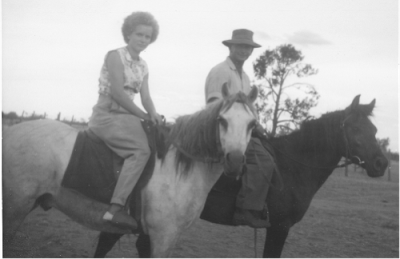 For all my whining, the holiday was great fun and quite an experience for this “city girl”.
For all my whining, the holiday was great fun and quite an experience for this “city girl”. Oh, and the train trip home was uneventful.
Published on February 11, 2018 12:25
February 3, 2018
Preconceptions and Misconceptions
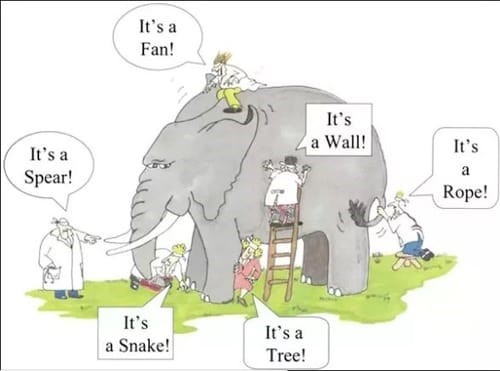 How accurate are our first impressions of others? What first impressions do we convey?
How accurate are our first impressions of others? What first impressions do we convey? I recently retired from working for a food van at a truck stop. My boss allowed me to put my two books (Angel with Drumsticks and For the Love of a Dingo) for sale on the counter. I was amused when customers were surprised that a ‘breakfast cook’ wrote the books. Was their preconception of someone doing my job that I would not have the education, knowledge or skill to write much more than a text message or Facebook post?
Similarly, someone who knew me only as an author was surprised I was a tourism manager and consultant in my professional working life. I wonder what my ‘truckies’ would have thought about that?
It doesn’t matter to me how people perceive my abilities but there are times it is not only embarrassing for the person making a wrong assumption but an insult to the person misjudged.
When I was teaching customer service, I used a collection of photos of family and friends to gauge the students first impressions.
One was of my IT guru stepson, snapped while very grubby from working on his car. Ferrari is his surname and he is directly related to the famous Enzo Ferrari. One day, at a motor show he asked the attendants if he could have a closer look at the Ferrari on display, mentioning his name. They all laughed and derided him until he produced his driver’s license. They ended up looking the fools.
Is it a good idea to form judgments about people before knowing much about them?
What are the problems of being judgmental about customers?
How does our personal presentation and the first impression we create affect the way we are accepted or rejected by others?
I’d be interested if you have experienced any moments when you have been wrongly perceived.
Published on February 03, 2018 11:51
January 27, 2018
Stupid Questions by Tourists
 Having worked in the visitor industry and dealt with my fair share of “dumb questions of the day” I used this list when I taught tourism at a vocational college (another place for getting the “dumb question of the day”. What used to amaze me was that often students couldn’t see problems with these questions.
Having worked in the visitor industry and dealt with my fair share of “dumb questions of the day” I used this list when I taught tourism at a vocational college (another place for getting the “dumb question of the day”. What used to amaze me was that often students couldn’t see problems with these questions.These are real questions taken from the US National Parks Guides, Visit Scotland, Visit Britain, English Heritage and Australian Tourist Board.
"Are there any lakes in the Lake District?"
"In what month is the May Day demonstration?"
"What is the entry fee for Brighton?"
"Why on earth did they build Windsor Castle on the flight path ofHeathrow?"
"Is this where Sharon and Ozzie actually live?" Asked by a visitor toOsborne House, Isle of Wight
"Is Wales closed during the winter?"
"Can you tell me who performs at the circus in Piccadilly?"
"Why did they build so many ruined castles and abbeys in England?"
"What time do you switch the mist off?" - Asked a visitor to Dover Castle
"Do you have any information on (former Page 3 girl) Samantha Fox?"
"Which bus do I get from the Orkney Islands to the Shetland Islands?"
"What time does the Loch Ness monster surface and who feeds it?"
"Is Edinburgh in Glasgow?"
"Can I wear high heels in Australia?"
"Are there supermarkets in Sydney and is milk available all year round?"
"I want to walk from Perth to Sydney - can I follow the railroad tracks?"
"Which direction is North in Australia?"
"Was this man-made?"- A Tourist at the Grand Canyon National Park
"How much of the caves is underground?"
"Do you know of any undiscovered ruins?"
Published on January 27, 2018 11:37
January 20, 2018
The Madman by CJ Dennis
 26th January is Australia Day so I have chosen a poem by my favourite Australian writer, CJ Dennis.
26th January is Australia Day so I have chosen a poem by my favourite Australian writer, CJ Dennis.
"I should go mad;' he said, "in such a place! The lack of company, the loneliness!
Nothing but trees to stare you in the face;
Nothing to do; no life; no pep; no pace!
I'd die of melancholy” I said "Yes?"
"Why, yes’” said he. "The suburbs can be bad.
But this? Why, heavens, man! I should go mad:'
"What do you do?" he said. "How find a way To pass the time? Of course, the country's great
For rest and that" (I wished he'd go away;
I had a hundred things to do that day).
"Oh, well;' I said, "I think; I meditate
And-" "Think? A man can't always think –
Not all the time. Good lord! I'd take to drink!"
"I'd go stone mad’” he said. "I know the trees
And birds and sky, and all that sort of stuff,
Please for a while. But man can't live on these.
I've got my love of nature’s harmonies;
But, spare me days, man, nature's not enough.
You work, you say. But then, when work is done,
What in the thunder do you do for fun?
"Ah, well;' he said. "It's peaceful, that I'll say.
Er - what's the time? Good heavens, I must go!
I've got a crowd of men to see to-day;
I'll miss the train! I must be on my way.
Can't spare another half a minute. So,
Good-bye. I wonder you're not dilly, lad.”
"Ah, that's just it;' I told him. "I am mad."
Published on January 20, 2018 12:22
January 13, 2018
Why I wrote Angel with Drumsticks - the Consequences by Pamela King
 In April 2015 I posted a blog titled Why I wrote Angel with Drumsticks http://anunlikelyone.blogspot.com.au/2015/04/why-i-wrote-angel-with-drumsticks.html. As explained in that blog, Angel with Drumsticks is a true story. The information was drawn from recollections of the band’s founder and leader, Angelo Ferrari as well as extensive research. It is a story you won’t find factually represented on the internet in full.
In April 2015 I posted a blog titled Why I wrote Angel with Drumsticks http://anunlikelyone.blogspot.com.au/2015/04/why-i-wrote-angel-with-drumsticks.html. As explained in that blog, Angel with Drumsticks is a true story. The information was drawn from recollections of the band’s founder and leader, Angelo Ferrari as well as extensive research. It is a story you won’t find factually represented on the internet in full. Since publishing the book there have been some interesting responses to the story.
The subtitle of Angel with Drumsticks is The rock that shook the foundations of the Vatican and I think this accurately sums up the series of events that followed the first performance of La Messa Dei Giovani; the First Rock Mass.
The Catholic church has been under a lot of criticism in recent years for its cover up of a variety of scandals and attitudes and, I guess, this book could be seen is just another one. But, it needs to be remembered that, like so many other scandals, it impacted on the lives of innocent followers.
Firstly, it has been interesting to note reactions of people reading the back cover (see below). Some will eagerly purchase the book wanting to know more about how a revered and long-standing institution has played with the beliefs of its followers. Others, devout members, have scoffed at its claims and even verbally abused me for publishing such “rubbish” and “lies”.
I am aware of at least one bookshop that refused to stock the book based on its subject matter.
More extreme religiously zealous people have written abusive and condemning comments on the Angel and the Brains Facebook page. ( https://www.facebook.com/Angel-and-the-Brains-116358388538911/) and sent personally offensive emails. Some demanded the withdrawal of the book from circulation.
I don’t know if the Vatican has seen or even heard of the book, but it would surprise me if they were not aware of it. To my knowledge there has been no comment or response to the claims.
I should also point out that many of the facts of the story have been confirmed by other former band members on the Angel and the Brains Facebook page and in personal emails.
If anyone would like to know more about the story they can contact me by email on pam@pam.id.au.
Back cover
This is the story as it was told to the author by Angelo Ferrari, drummer, singer and founder of the Italian Beat rock group Angel and the Brains.
After recounting how the band was formed and its music ambitions, it continues to tell the true story about the aftermath of La Messa Dei Giovani (La Messa).
La Messa was conceived to fulfil the desires of the Vatican II to make the Catholic Church more appealing to young people but, because of resulting bitter and vicious arguments within the church and the media, the Vatican took a course of action that was inconsiderate, hurtful and cold hearted.
The story describes how these young musicians, who had responded to an invitation from the church to perform the first rock mass in Rome had their fledgling careers destroyed by the Vatican.
The reader will discover that many articles written in recent years are wrong in their descriptions of what happened following La Messa and falsely acclaim the event as being a successful innovation of the Catholic Church at the time.
Published on January 13, 2018 15:25
January 5, 2018
La Befana: The Good Witch of Christmas by Pamela King
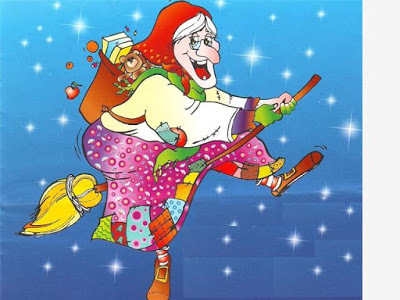 The once beautiful woman swept the floor, sighed, and started sweeping again. He can’t be dead she thought to herself, not my beautiful baby. Grief over the loss of her beloved son so recently after being widowed, began to age her. Some say she went mad.
The once beautiful woman swept the floor, sighed, and started sweeping again. He can’t be dead she thought to herself, not my beautiful baby. Grief over the loss of her beloved son so recently after being widowed, began to age her. Some say she went mad. In an endeavour to eliminate the child professed to become the new king, Herod had ordered the death of all male children born in the year of Jesus. The soldiers had rampaged through her village and taken her baby boy along with all others.
In her sorrow she became obsessive about keeping her home spotlessly clean, sweeping the floor incessantly. One day three wise men knocked at her door. Although she was poor with only rags for clothes and broken shoes, she made them welcome in her humble, but cosy, cottage giving them food and a room for the night. They told her they were following a bright star that would lead them to the new born baby Jesus and showed her the special gifts of gold, incense and myrrh they carried for the Christ child.
The next morning, they thanked her for her hospitality and invited her to accompany them. She declined saying she was too busy with her housework and she had nothing worthy to give the special child.
Delusional with grief, she wondered if this baby could be her own, saved from the evil King Herod’s cruel plans. She left her home, still with her broom in her hand, to catch up to the wise men, taking all her son’s clothes and toys. She also bundled up food she had prepared.
Magically, she began to fly on her broomstick and eventually found Jesus. Realising this was not her child she presented him, and his parents, with her son’s belongings and the food as gifts.
By this time, her faced had aged more with many lines and hair had turned completely grey. Joseph, the child’s father, looked at the face of this stranger bearing gifts and wondered about her past and what extreme sorrow she had suffered.
Delighted at the gifts, and in gratitude to her generosity, Jesus and his father blessed her and gave her a gift in return. For one night a year, and for all eternity, she would be honorary mother of every child as if they were her own.
The twelve days of Christmas finish with the Epiphany, a celebration of renewal, on 6th January. Overjoyed with her blessing, this is the time she takes to her broom delivering gifts to every child; blessing good children and punishing bad ones. She became known as La Befana from the Roman dialect pronunciation of the Italian name for the religious festival, Epifania.
On the eve of the epiphany she climbs down chimneys to find stocking hanging near the fireplace. From her basket to places candy, fruit, toys and books in the stockings of the good children goes; but naughty ones receive coal, onions or garlic. In return the families leave wine and cakes for her. A smiling but very old woman with a slight hunch, she still wears rags with colourful patches covered with soot from climbing down the chimneys.
La Befana does not like to be seen so here is a word of warning. If you ever spot her on her rounds do not look at her or she will smack you across the face with the end of her broom.
Published on January 05, 2018 16:06
December 16, 2017
Australian Twist on a Classic Christmas Story
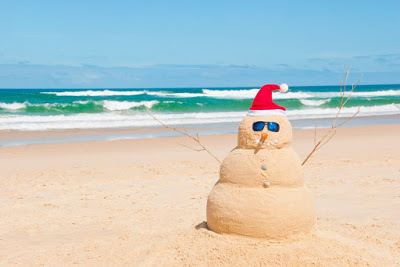
'Twas the night before Christmas; there wasn't a sound. Not a possum was stirring; no-one was around.
We'd left on the table some tucker and beer,Hoping that Santa Claus soon would be here;
We children were snuggled up safe in our beds,While dreams of pavlova danced 'round in our heads;And Mum in her nightie, and Dad in his shorts,Had just settled down to watch TV sports.
When outside the house a mad ruckus arose;Loud squeaking and banging woke us from our doze.We ran to the screen door, peeked cautiously out,Snuck onto the deck, then let out a shout.
Guess what had woken us up from our snooze,But a rusty old Ute pulled by eight mighty 'roos.The cheerful man driving was giggling with glee,And we both knew at once who this plump bloke must be.
Now, I'm telling the truth it's all dinki-di,Those eight kangaroos fairly soared through the sky.Santa leaned out the window to pull at the reins,And encouraged the 'roos, by calling their names.
'Now, Kylie! Now, Kirsty! Now, Shazza and Shane!On Kipper! On, Skipper! On, Bazza and Wayne!Park up on that water tank. Grab a quick drink,I'll scoot down the gum tree. Be back in a wink!'
So up to the tank those eight kangaroos flew,With the Ute full of toys, and Santa Claus too.He slid down the gum tree and jumped to the ground,Then in through the window he sprang with a bound.
He had bright sunburned cheeks and a milky white beard.A jolly old joker was how he appeared.He wore red stubby shorts and old thongs on his feet,And a hat of deep crimson as shade from the heat.
His eyes - bright as opals - Oh! How they twinkled!And, like a goanna, his skin was quite wrinkled!His shirt was stretched over a round bulging bellyWhich shook when he moved, like a plate full of jelly.
A fat stack of prezzies he flung from his back,And he looked like a swaggie unfastening his pack.He spoke not a word, but bent down on one knee,To position our goodies beneath the yule tree.
Surfboard and footy-ball shapes for us two.And for Dad, tongs to use on the new barbeque.A mysterious package he left for our Mum,Then he turned and he winked and he held up his thumb;
He strolled out on deck and his 'roos came on cue;Flung his sack in the back and prepared to shoot through.He bellowed out loud as they swooped past the gates-MERRY CHRISTMAS to all, and goodonya, MATES!'
Published on December 16, 2017 11:44
December 10, 2017
More on Language and Writing
 I recently posted a blog titled As Writers, Do We Need to be Perfect with our Language All the Time?
I recently posted a blog titled As Writers, Do We Need to be Perfect with our Language All the Time?Continuing on from that blog, there is another aspect of provincial or regional writing I am covering here and would really like your input.
As authors our target market is world-wide but those us that live in a country not dominant in the publishing world (in my case Australia) we often have our own set of problems communicating with readers.
Although we speak English, we have our own jargon and slang. Readers may also not be familiar with our cities and towns, geography or landmarks.
One particular area that varies around the world is weights and measures. UK and Australia use metric while the USA use the imperial measurements and, in some cases, these can vary from those previous used in UK etc.
In the case of the book I am writing, the life of the lady who is the subject of the biography spans 1928 to 2002. During that time Australia converted from pounds, shillings and pence to decimal currency and from imperial measurements to metric. It is similar in Europe with the conversion to Euro.So, dear readers, here are my questions:
Does slang and jargon need to be written in an ‘international’ way or does that lose the uniqueness of place and people.Should we provide maps and images containing information about the scene of the story? Are descriptive passages enough? Or should we leave it to the reader to search out unfamiliar information.
Do we just use the terms we are familiar with or do we add explanations such as conversions tables, footnotes and appendices?
Does the importance of attention to this detail apply more to non fiction than fiction?
Published on December 10, 2017 17:52



